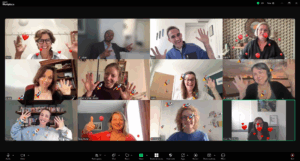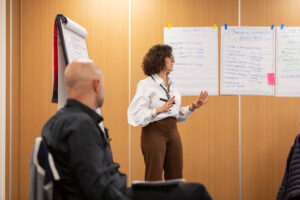For decades, the traditional narrative of leadership has been dominated by masculine traits: assertiveness, decisiveness, and authority. These qualities have been seen as synonymous with strength and success. At the same time, the qualities often associated with the feminine—empathy, care, and curiosity—have been undervalued or dismissed in professional contexts. This imbalance has contributed to workplace cultures that prioritise results over relationships, competition over collaboration, and short-term gains over long-term impact.
The truth is, masculinity and love are not incompatible. When masculine energy is informed and guided by feminine energy, the result is a powerful synergy that drives progress while fostering connection and inclusion. Leadership informed by both strength and care creates teams and organisations that thrive.
Let’s explore how the integration of masculine and feminine energies transforms leadership, the role of Relationship Systems Intelligence (RSI) in holding these dualities, and how tools like ORSC’s MetaSkills help leaders embody love and compassion without compromising assertiveness or strength.
Reframing Masculinity and Love in the Workplace
The common perception of masculinity as incompatible with love stems from outdated stereotypes. Traits like empathy and vulnerability have been seen as weaknesses, while strength and decisiveness are viewed as necessary for leadership. But leadership in today’s workplaces requires a more nuanced approach—one that balances power with care and decisiveness with inclusion.
Masculine energy is not inherently at odds with love; it is strengthened when paired with feminine qualities:
- Masculine Traits: Action, structure, decisiveness, and results.
- Feminine Traits: Care, curiosity, empathy, and collaboration.
When combined, these energies create balanced leadership that honors both purpose and people.
Real-Life Examples of Masculine and Feminine Synergy
The most successful organisations often embody this balance of masculine and feminine energies in their leadership and culture. Two real-life examples highlight how this integration drives success:
1. Doug and Mary Perkins, Founders of Specsavers
Doug and Mary Perkins started Specsavers on a ping-pong table in their spare room in 1984 after UK regulations were changed to allow professionals to advertise their services. Their partnership is a prime example of how the balance of masculine and feminine energies creates success.
- Doug’s Masculine Energy: Doug Perkins brought a decisive, results-driven approach to the business, focusing on growth and strategy. His focus on structure and measurable goals laid the foundation for Specsavers’ rapid expansion.
- Mary’s Feminine Energy: Dame Mary Perkins introduced empathy and care into the company’s culture. She prioritized customer relationships and employee well-being, ensuring that the company’s growth did not come at the expense of its values.
Together, their synergy of action and care created a company culture that thrives on both efficiency and human connection, making Specsavers a globally recognised brand.
2. Bill and Melinda Gates: The Success Behind Microsoft
While Bill Gates is often credited as the visionary behind Microsoft, Melinda French Gates played an equally important role in shaping both the company and their shared philanthropic endeavours.
- Bill’s Masculine Energy: Bill Gates brought innovation, bold decision-making, and relentless focus to Microsoft, driving its position as a global tech leader.
- Melinda’s Feminine Energy: Melinda Gates, who worked at Microsoft in product development and rose to a leadership role, brought relational intelligence and inclusivity to the company’s culture. Her influence extended beyond technical innovation, fostering collaboration and long-term thinking.
Their partnership demonstrates how balancing action with empathy and ambition with care leads to sustainable success—not only for the organisation but for society at large.
How Relationship Systems Intelligence (RSI) Holds Dualities
Relationship Systems Intelligence (RSI) teaches us that teams and relationships are dynamic systems where seemingly opposing qualities can coexist harmoniously. Masculinity and femininity are not competing forces but complementary energies that, when integrated, create resilience and adaptability.
Holding Dualities in Leadership:
- Strength and Vulnerability: Leaders can demonstrate strength by making tough decisions while also showing vulnerability by admitting mistakes or seeking feedback.
- Power and Care: Power becomes a constructive force when grounded in care, ensuring it uplifts rather than dominates.
- Decisiveness and Curiosity: Leaders can act decisively while remaining open to diverse perspectives, fostering innovation and inclusivity.
Using ORSC Tools to Balance Masculine and Feminine Energies
The ORSC methodology provides actionable tools to help leaders integrate love and masculinity, creating balanced leadership that prioritises connection and results.
1. MetaSkills Framework
MetaSkills are intentional mindsets or attitudes that leaders can cultivate to guide their actions and interactions. Feminine MetaSkills like curiosity, compassion, and resilience help leaders balance assertiveness with care.
- Example in Practice: A leader navigating conflict in a team might use the MetaSkill of compassion to approach the situation with understanding, ensuring a resolution that prioritises relationships as well as results.
2. Designed Team Alliances (DTA)
DTAs help teams co-create agreements about how they will work together, emphasising respect, collaboration, and shared purpose.
- Example in Practice: A team might agree to prioritise both accountability (masculine) and psychological safety (feminine), ensuring that results are achieved in an environment of trust and care.
3. The 3rd Entity
This tool focuses on the relationship system as a whole, shifting the focus from individual perspectives to the collective needs and goals of the team.
- Example in Practice: A team debating a high-stakes decision could use the 3rd Entity to explore what is best for the system as a whole, balancing bold action with inclusive decision-making.
The Benefits of Balancing Love and Masculinity in Leadership
When masculine energy is informed by feminine energy, the results are transformative:
For Leaders:
- Authentic Leadership: Leaders feel empowered to show up as their full selves, blending strength with vulnerability.
- Greater Influence: Leaders who balance decisiveness with care earn trust and loyalty.
For Teams:
- Psychological Safety: Teams feel supported and valued, enabling them to take risks and innovate.
- Stronger Collaboration: The integration of masculine and feminine energies fosters inclusive and cohesive teamwork.
For Organisations:
- Sustainable Growth: Balancing short-term action with long-term vision ensures meaningful and lasting success.
- Positive Cultures: Organisations that honour both masculine and feminine energies attract top talent and foster engagement.
Key Takeaways: Strength and Care in Leadership
Love and masculinity, when combined, create balanced leadership that drives progress while fostering connection. Masculine traits like decisiveness and action, when guided by feminine qualities like empathy and curiosity, build trust and respect in professional relationships.
As demonstrated by leaders like Doug and Mary Perkins and Bill and Melinda Gates, the integration of these energies is not only possible but essential for long-term success. By leveraging tools like MetaSkills, Designed Team Alliances, and The 3rd Entity, leaders can create purpose-driven cultures where love and masculinity coexist, empowering teams to thrive.
Ready to explore how love and masculinity can transform your leadership? Discover how ORSC training can help you achieve balanced and impactful leadership.






